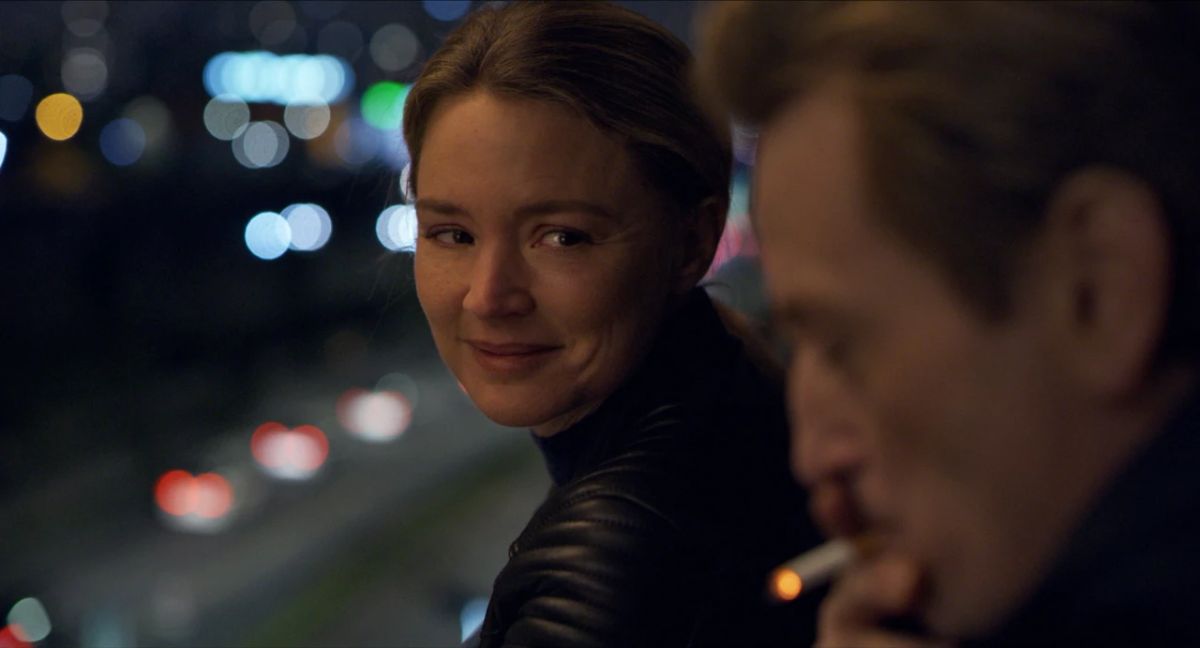It takes a few seconds for Mia’s life to unravel in Alice Winocour’s Revoir Paris, then a whole lifetime to stitch it back together. Up until a fateful November night, the thirty-something (Virginie Efira) roams the French capital in a state of trouble-free bliss. She shares a luminous flat with her partner Vincent (Grégoire Colin) and an orange tabby cat; works as a Russian interpreter for politicians and intellectuals; and races through the City of Light on a Triumph, her outfit and helmet the same anthrax shade of the bike—a near superhero vision. It’s during a late-night ride that the sky suddenly breaks, forcing her to take shelter inside L’Étoile D’Or, a fancy bistro somewhere in the city center. She’s waiting for the rain to stop when a scream pierces the air and the first bullets start pelting tables and patrons.
Ostensibly a work of fiction, Revoir Paris orbits around a terrorist attack in the vein of those that shook the capital in November 2015, when 130 people were slaughtered by ISIL members in coordinated strikes. Winocour’s own brother was at the Bataclan—the theater where 90 people were gunned down—and Revoir Paris draws from the siblings’ recollections of this event. Winocour, who experienced it through the texts her brother sent her as he hid inside the theater; and the young man, who witnessed the massacre firsthand. This two-fold approach percolates through the film’s fabric. Essentially an exercise in recollection, Revoir Paris pivots on two main ideas: that memory is, by definition, imperfect, and that remembering, at its most successful, is always a collective process.
It’s a lesson Mia takes some time to understand. An ellipsis slingshots us three months since the tragedy, her staggering across the capital, shell-shocked and broken, desperately trying to put that night behind her while also feeling inescapably drawn back to it. It’s not long before she returns to L’Étoile D’Or, craning her neck in fear only to realize that—impossible as it may be to fathom—the place went back to business as usual. New clients sitting at the same old tables, tourists snapping selfies, couples flirting—it’s a desecration, a sacred ground vandalized. Yet the bistro hasn’t forgotten about the tragedy; it even set up a weekly get-together where survivors and relatives of the deceased can try to piece things together. It’s in these meetings—the tense, pugilistic atmosphere they radiate—that Winocour locates some of the film’s most intriguing conflicts. Fractured memories give way to devastating accusations, complicating Mia’s own recollections and her role in the events. And it’s during one such session that Mia happens into Thomas (Benoît Magimel), the one face she remembers best from that night—a finance guy who was celebrating his birthday at the table opposite hers when the terrorists opened fire, killing everyone from his party.
Revoir Paris gravitates around an act of unspeakable violence, but it is not a dirge, and the tone is only fitfully plangent. Credit goes to Efira, who shoulders it with a performance that never dips into treacly, and to Winocour, who designs her film as a curious kind of mystery tale. As new details come to the fore and Thomas helps Mia connect the threads, Paris whittles down to what’s basically a manhunt. Someone else was with Mia that night—a young cook who helped her hide inside the kitchen and held her hand for the two hours they spent locked there. She wants to track him down, and Paris devotes its second half to her search.
Winocour is an astute, piercing writer, able to convey huge swaths of meaning in few, cutting lines—qualities that have arguably never been more evident than in Mustang, which she co-wrote with director Deniz Gamze Ergüven. Here, too, her script is dotted with a handful of shattering exchanges, especially as Paris tries to sponge up the alienation Mia succumbs to as the distance from her loved ones starts to widen. “People look at me like I’m an attraction,” she tells Vincent at a house-party, though the truth, per a remark by an old friend, is that they just don’t really know how to look at her at all (“It’s tricky knowing what to talk about with you”). But for all its emphasis on the messiness of memory, the film often feels linear to a fault.
There’s no denying the affection Winocour pours into Mia’s healing. For a drama dealing with a wound that’s still unbearably vivid, Paris is both tactful and heartfelt. But as time went on I found myself wondering how much more affecting the film might have turned out had Winocour chosen to complicate some of its heavy-handed metaphors and cliches. As it is, the journey feels almost too formulaic in its beats and imagery, from the often stilted exchanges between Thomas and Mia (“we need to outfit fate”) to their shared scars, physical and psychological, culminating with a reunion that registers as a we-are-one moment that’s as sincere as it is surprisingly mute.
Revoir Paris premiered at the Cannes Film Festival.

